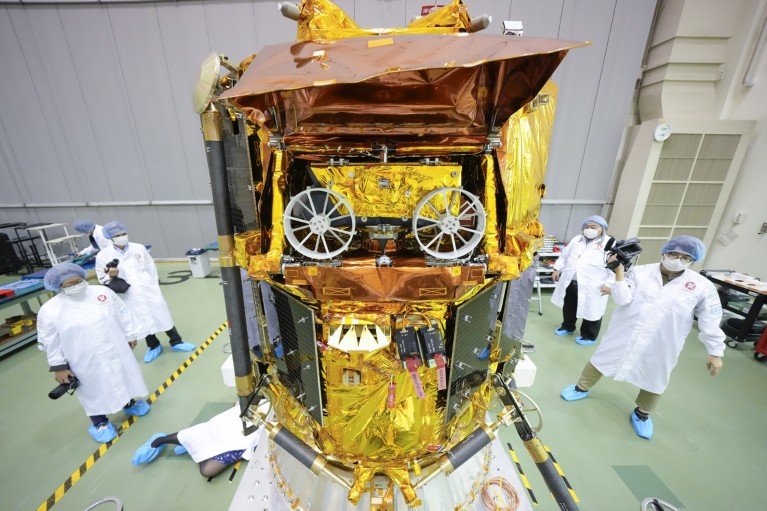Hello Nature readers, would you like to get this Briefing in your inbox free every day? Sign up here.

The Resilience lunar lander and Tenacious rover were launched to the Moon today.Credit: Toru Hanai/Bloomberg/Getty
The firms ispace and Firefly Aerospace each launched spacecraft to the Moon today, both on the same rocket. The launch went without a hitch, but private missions to the Moon are notoriously difficult to pull off. Scientists won’t rest easy until the research gear on the probes is up and running, which won’t be for weeks; or months in some cases. Both missions aim mainly to demonstrate technologies needed to land on the Moon, but they have a range of scientific instruments with them for good measure.
Nature | 5 min read
A group of 58 researchers have published a revised definition of obesity, dividing the condition into two categories: preclinical obesity, when a person has extra body fat but their organs work normally, and clinical obesity, when excess fat harms the body’s organs and tissues. Their new definition aims to offer a more nuanced picture than body mass index (BMI), which is calculated from a person’s weight and height. This shift could improve clinical care, public-health policies and societal attitudes toward obesity, says endocrinologist Elisabeth van Rossum.
Nature | 6 min read
Reference: The Lancet Diabetes & Endocrinology paper
Retractions owing to honest mistakes might not often make headlines, but that doesn’t make them any less stressful, say the results of a survey. “You rarely find any information about the human nature of these errors,” says metascience researcher Marton Kovacs. That inspired him and his colleagues to reach out to researchers who had retracted a paper due to accidental data-management errors. Almost half of respondents reported the process causes ‘extreme stress’, which could be because of the research community’s negative perception of retractions, says Kovacs.
Nature | 4 min read
Reference: Royal Society Open Science paper
Question of the week
The social-media platform Bluesky has become popular with researchers in the wake of massive changes at X (which we’re all still calling Twitter). Nature is keen to find out how scientists are using Bluesky and whether it has become their go-to social-media platform. Do you use Bluesky? Has it replaced X? We want to hear from you — please take our survey.
Nature survey | 2 min of fun
For those looking to follow Nature journalists (including yours truly) on Bluesky, here’s the Nature magazine starter pack.
Features & opinion
In a first-of-its-kind editorial, Nature addresses US president-elect Donald Trump directly to outline a route to a positive legacy for his administration. It urges Trump to prioritize climate and energy security, to recognize the value of research and collaboration to the success of the United States and the world, and to take care in how plans to reform the government are brought to bear. It also asks Trump to continue the country’s longstanding role as a key member of global organizations that seek solutions to global problems.
Nature | 6 min read
Australia’s ban on social media for under-16s is a “blunt instrument” that could cause children to feel unable to talk to their parents about their online lives, writes cyberbullying expert Marilyn Campbell. She argues instead that governments should invest in studies to determine best practices for parents to educate their children and regulate their screen time. In the meantime, parents should be helped using the available evidence. “Supporting children as they navigate the online world is similar to guiding them in the real one,” Campbell writes. “And that means that parents must also understand social media.”
Nature | 5 min read
When bioethicist Cynda Hylton Rushton observed nurses at work, she saw that they made decisions that challenged their moral compasses — for example, when they were obliged to give a painful treatment that they knew probably wouldn’t work. We all face occasions when we must make the best decision we can under imperfect circumstances, and a certain amount of ‘moral suffering’ is necessary to prevent us from becoming disengaged or complacent. But it needn’t cause the “pervasive despair and helplessness” that Rushton saw permeating healthcare. “By turning our focus toward our strengths and using them to build moral resilience,” she writes, “we can know that, while we had to do one of the hardest things we were ever called upon to do, we don’t have to live with disabling regret for the decision we ultimately made.”
Aeon | 26 min read
Today I’m interested to hear that the ispace rover that began its journey to the Moon today is carrying a little red Swedish house. Artist Mikael Genberg has been planning to place the tiny abode on the Moon for 25 years, and it’s already been to the International Space Station. “What’s the purpose? It’s art,” says Genberg.
While I sit with my feelings about the first house on the moon, why not send me your feedback on this newsletter? Your e-mails are always welcome at [email protected].
Thanks for reading,
Flora Graham, senior editor, Nature Briefing
With contributions by Jacob Smith
Want more? Sign up to our other free Nature Briefing newsletters:
• Nature Briefing: Careers — insights, advice and award-winning journalism to help you optimize your working life
• Nature Briefing: Microbiology — the most abundant living entities on our planet — microorganisms — and the role they play in health, the environment and food systems
• Nature Briefing: Anthropocene — climate change, biodiversity, sustainability and geoengineering
• Nature Briefing: AI & Robotics — 100% written by humans, of course
• Nature Briefing: Cancer — a weekly newsletter written with cancer researchers in mind
• Nature Briefing: Translational Research — covers biotechnology, drug discovery and pharma


